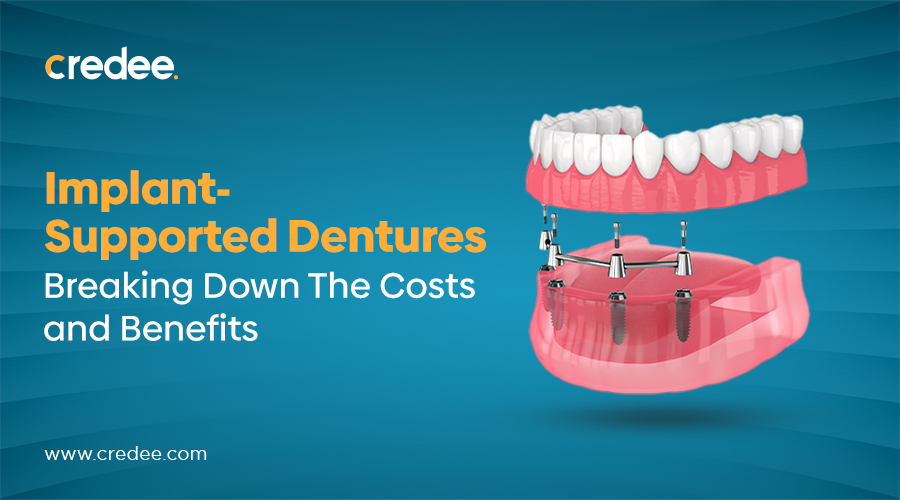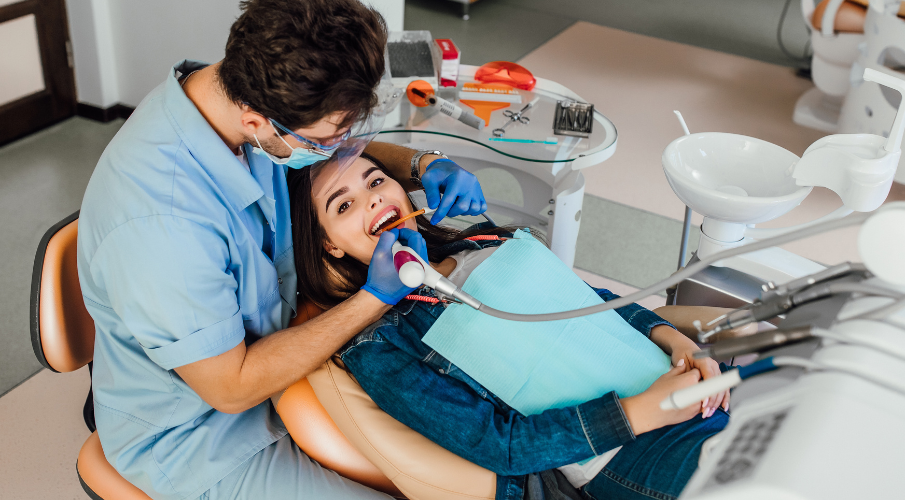
Implant supported dentures are a modern solution designed to replace multiple missing teeth with greater stability. Unlike conventional dentures that rest on your gums, these are firmly attached to your jawbone through dental implants, giving you a more secure and natural feel. If you want a dependable and comfortable option for restoring your smile, implant supported dentures are a fantastic choice.
| Dental Implants: A Hidden Solution For Millions According to the American Academy of Implant Dentistry (AAID), in the US, over 150 million people are missing at least one tooth, but only about a million get treatment each year, with 2.5 million implants placed. This shows that dental implants have a great chance to become an even more popular choice for restoring teeth. |
Benefits of Implant Supported Dentures
Implant supported dentures come with several great benefits:
1. They stay securely in place, unlike traditional dentures that can slip.
2. They help prevent bone loss in your jaw by mimicking natural tooth roots.
3. They look just like natural teeth, giving you a confident smile.
4. They restore oral health, making eating, talking, and enjoying life easier.
5. They last much longer than regular dentures, offering a long-term solution for missing teeth.
What’s the Typical Cost of Implant Dentures?
Most patients can expect to pay anywhere from $8,000 to $14,000 on average for implant dentures. However, several factors can influence where your specific costs fall within this range.
Understanding the Costs of Implant Dentures: What You Should Know
The cost of implant dentures can differ based on several factors:
1. Materials Used: The materials chosen for implant dentures greatly influence the cost. Higher-quality materials not only look more natural but are also more durable, making them a worthwhile investment.
2. Location And Pricing: Where your procedure is done can impact the price. If you're in a big city where the cost of living is high, be prepared for higher expenses. Conversely, smaller towns or rural areas offer more budget-friendly options.
3. Pre-Treatment Requirements: Sometimes, you might need additional dental work before the implants can be placed, such as tooth extractions, bone grafts, or gum disease treatment.
4. Post-Procedure Care: Taking care of your implants after the procedure is vital for longevity. Regular cleanings and check-ups will help maintain your implants and prevent more expensive repairs.
5. Anesthesia Choices: The anesthesia or sedation used during your procedure can also affect the cost. While some people do well with just local anesthesia, others may require more extensive sedation. Your dentist will guide you to the best option to ensure your comfort and safety.
6. Insurance And Payment Options: Dental costs can add up quickly, but there are ways to make them more manageable. Many dental practices work with insurance providers and offer financing options to help ease the financial burden.
Now that we have a fair idea of the factors influencing the overall costs, let’s discuss the phase-wise costs, state-wise costs, and costs in various countries.
Explore denture costs and budget-friendly solutions just for you.
Phase-Wise Price of Implant Supported Dentures
Understanding the associated costs is crucial for effective financial planning when considering implant supported dentures. By familiarizing yourself with these costs, you can make informed decisions and prepare for the journey to restoring your smile.
| Cost Breakdown | Details | Estimated Cost |
|---|---|---|
| Consultation & Diagnostic Exams | Initial consultation, X-rays, 3D imaging | $200 - $700 |
| Pre-Procedural Treatments | Bone grafting, sinus augmentation, gum disease treatment | $500 - $5,000 |
| Anesthesia & Sedation | Local anesthesia, sedation options | $100-$250 |
| Temporary Dentures | Used during healing period | $400 - $2,500 |
| Permanent Dentures | Custom-made dentures, abutment placement | $1,000 - $6,000 |
| Implant Placement | Number of implants needed, quality of implants | $1,000 - $5,000 per implant |
| Aftercare & Maintenance | Regular cleanings, check-ups | $200 - $1,000 annually |
State-Wise Cost of Implant Supported Dentures
In this breakdown, we’ll explore the estimated cost ranges for implant supported dentures in several states, giving you a clearer picture of what to expect as you consider this investment in oral health.
| U.S. State/Region | Average Cost |
|---|---|
| Alabama | $8,498 |
| Alaska | $9,102 |
| Arizona | $10,458 |
| Arkansas | $8,989 |
| California | $11,139 |
| Colorado | $12,078 |
| Connecticut | $9,567 |
| Delaware | $12,897 |
| Washington, DC | $11,471 |
| Florida | $13,212 |
| Georgia | $9,273 |
| Hawaii | $12,244 |
| Idaho | $10,243 |
| Illinois | $8,990 |
| Indiana | $9,325 |
| Iowa | $10,920 |
| Kansas | $8,965 |
| Kentucky | $9,394 |
| Louisiana | $10,471 |
| Maine | $9,118 |
| Maryland | $9,889 |
| Massachusetts | $11,615 |
| Michigan | $12,523 |
| Minnesota | $9,659 |
| Mississippi | $11,115 |
| Missouri | $12,118 |
| Montana | $9,818 |
| Nebraska | $10,316 |
| Nevada | $11,171 |
| New Hampshire | $12,629 |
| New Jersey | $11,895 |
| New Mexico | $11,345 |
| New York | $10,474 |
| North Carolina | $12,599 |
| North Dakota | $9,445 |
| Ohio | $9,567 |
| Oklahoma | $10,990 |
| Oregon | $11,792 |
| Pennsylvania | $12,943 |
| Rhode Island | $10,548 |
| South Carolina | $10,602 |
| South Dakota | $9,493 |
| Tennessee | $10,188 |
| Texas | $12,465 |
| Utah | $10,737 |
| Vermont | $12,321 |
| Virginia | $10,951 |
| Washington | $10,132 |
| West Virginia | $12,115 |
| Wisconsin | $10,634 |
| Wyoming | $10,522 |
How Much Are Implant Supported Dentures in Various Countries?
This overview will delve into the estimated costs of implant supported dentures in various countries, including:
| Country | Cost | Description |
|---|---|---|
| Mexico | $4,000 - $8,000 | Lower costs due to reduced labor and operational expenses |
| Canada | $7,000 - $11,000 | Comparable to U.S. costs; may vary by province |
| Australia | $6,000 - $10,000 | Affordable pricing due to government subsidies and competitive private healthcare |
| United Kingdom | $10,000 - $20,000 | The availability of NHS dental services makes dental care affordable |
| India | $3,000 - $6,000 | Significantly lower due to lower overhead costs |
Types of Implant Supported Dentures: Options and Cost Breakdown
Implant supported dentures come in several types, each offering distinct advantages depending on the patient's needs and dental situation. Here are the main types:
| Type Of Implant Supported Dentures | Description | Approximate Cost |
|---|---|---|
| Bar-Retained Dentures | Use a thin metal bar attached to implants; dentures clip onto the bar for support and stability. | $5,000 - $10,000 |
| Ball-Retained Dentures | Implants have ball-shaped connectors that fit into sockets on the denture, providing a secure fit. | $6,000 - $20,000 |
| Fixed Implant Supported Dentures (per arch) | Permanently fixed in place using implants; cannot be removed by the patient and feel the most natural. | $15,000 - $30,000+ |
| All-on-4 Implants | A full set of teeth is supported by just four implants, offering quick recovery and a less invasive procedure. | $20,000 - $50,000+ |
| Snap-In Dentures | Removable dentures that snap onto implants offer more security than traditional dentures and are easy to remove for cleaning. | $5,000 - $15,000 |
Upper Implant Supported Dentures
Upper implant supported dentures or full-arch restoration, are a permanent solution for replacing a whole row of missing teeth.
How Much Do Upper Implant-Supported Fixed Dentures Cost?
Full arch restoration for the upper jaw typically costs between $20,000 and $50,000. This price covers everything from the first consultation and prep work, like sinus lifts or bone grafts, to the implant surgery and final teeth. The total cost can change depending on how many implants you need and your location.
Important Considerations for Upper Implant-Supported Fixed Dentures
1. Sinus Area: Since your upper jaw is near the sinus cavities, the dentist is extra cautious to avoid any issues. They might perform a sinus lift to create more space if there isn’t enough room.
2. Bone Strength: The upper jaw usually has less bone than the lower jaw, so some people may need a bone graft to ensure implants stay secure.
3. Implant Placement: The dentist will carefully place the implants across your upper jaw to give you the best support and comfort.
4. Aesthetics: Because your upper teeth are more visible when you smile or talk, the dentist will focus on ensuring your new teeth look natural.
What Are Removable Implant Supported Dentures?
Removable implant supported dentures snap onto implants in your jaw, giving them way more stability than regular dentures. They stay in place when you talk or eat, and the best part is you can take them out easily for cleaning or while you sleep. You get the strength of implants with the flexibility of removable dentures.
How to Clean Implant Supported Dentures?
Proper care is essential for the longevity and health of your implant supported dentures. Regular cleaning and maintenance prevent gum disease, infections, and other complications. Following these simple steps, you can keep your dentures clean, fresh, and in optimal condition.
1. Gentle brushing: Use a soft toothbrush and non-abrasive toothpaste to gently clean all parts of your dentures—especially the gums, teeth, and attachments. You can use a small brush to clean around the implants.
2. Careful Flossing: Gently clean where your dentures touch your gums using a special dental floss.
3. Regular Soaking: If your dentures are removable, soak them overnight or once a week in a denture cleaner. You can also use a mix of water and vinegar to remove stains.
4. Use A Water Flosser: A water flosser can help clean your gums and where the dentures connect to the implants.
5. Rinse With Mouthwash: An antibacterial mouthwash can help prevent plaque and keep your mouth fresh.
6. Visit Your Dentist: Ensure visiting your dentist regularly for cleanings and check-ups.

Dental Financing: Ways To Pay For Dental Implant Grants
Read NowFinancing Options for Implant Supported Dentures
Yes, there are various financing solutions available for those seeking implant supported dentures:
1. Credit Cards: Dental or medical credit cards can help you cover the cost without a loan.
2. Payment Plans: Many dental offices offer flexible payment plans, letting you pay in smaller, monthly payments.
3. Dental Insurance: Some insurance plans might cover part of the cost. Check with your provider to see what’s included, as coverage can vary.
4. HSA or FSA: If you have a Health Savings Account or Flexible Spending Account, you can use those funds for dental work, with the added benefit of tax savings.
5. Personal Loans: You can also consider a personal loan from a bank or an online lender. Be sure to compare interest rates and terms to find the best option.
Why Opt for Credee Payment Plans for Your Implant Supported Dentures?
If you’re looking for implant supported dentures, Credee is a leading option. Here’s what makes it stand out:
Benefits for Customers:
- High Approval Rate: With a remarkable 97% approval rate, getting the financing you need is much easier.
- Flexible Payment Plans: Choose from various payment plans tailored to your budget, giving you the flexibility you deserve.
- No Credit Checks Required: You can secure financing without worrying about credit checks, simplifying the process.
Advantages for Businesses:
- Seamless API Integration: Credee integrates effortlessly with your existing systems, allowing you to enhance your financial processes without complications.
- Payment Protection: Our payment protection ensures your finances are safeguarded, allowing you to receive consistent monthly payments even if a customer defaults.
- Global Access: With support for over 10 languages, Credee helps you serve more customers by communicating in their preferred language, opening new opportunities for your business.
Summing Up!
Implant supported dentures can make a big difference in your life by providing a stable, natural-feeling fix for missing teeth. Unlike regular dentures, they won’t slip, help protect against bone loss, and let you eat, talk, and smile with confidence. The best part? With Credee’s flexible payment plans, the cost doesn’t have to be a worry. You can choose a plan that fits your budget without credit checks or complicated approvals. Ready for a more comfortable and confident smile? Take the first step today with Credee!
FAQ
1. How Do I Find Implant Supported Dentures Near Me?
Ans. To find implant supported dentures near you, just search online for "implant supported dentures near me." This will show you local dental clinics that offer the service. You can also visit dental association websites, like the American Dental Association (ADA), to find qualified dentists in your area.
It’s helpful to read reviews on sites like Yelp or Google Reviews to see how other patients feel about their experiences. Once you’ve found a few clinics, contact them to ask about the cost of implant supported dentures and if they accept your insurance.
2. What Is the Average Implant Supported Dentures Cost?
Ans. The average cost of implant supported dentures ranges from $8,000 to $30,000. This wide range is influenced by several factors, including the number of implants required, the type of materials used, the specific dental practice, and the geographic location.
3. Does Insurance Cover Dental Implant Supported Dentures?
Ans. Whether dental implant supported dentures are covered by insurance depends on your specific plan. Some insurance policies may cover part of the costs, while others might not cover them at all. It’s a good idea to check your insurance benefits and chat with your dentist to see what expenses might be covered and what you’ll need to pay out of pocket.
4. What Are the Advantages of Implant-Supported Fixed Dentures?
Ans. The main benefits of implant-supported fixed dentures are comfort and stability. Since they’re fixed in place, they won’t move around like traditional dentures, so no more worrying about them slipping while you eat or talk. They also help keep your jawbone healthy by providing the stimulation it needs, and they look more like natural teeth, so you can smile confidently.
Get implant supported dentures with flexible payments plans.
Schedule A Demo




